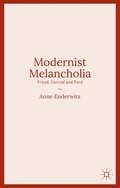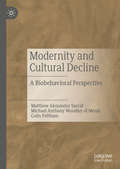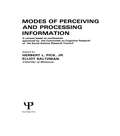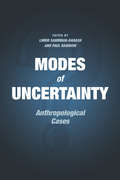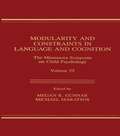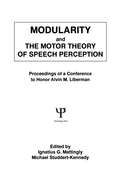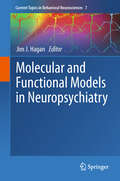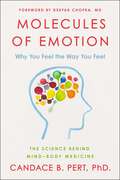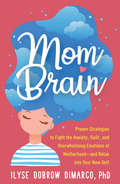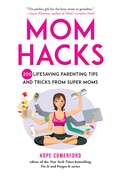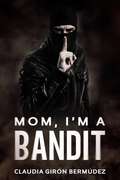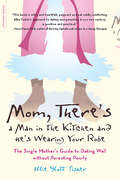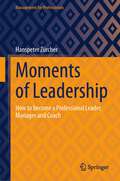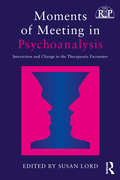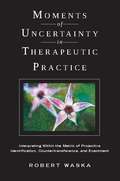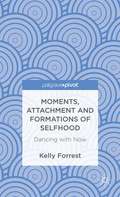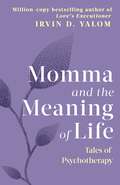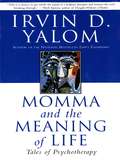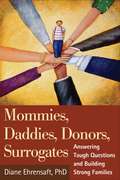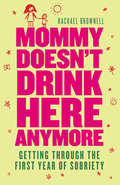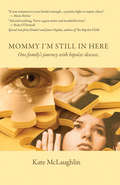- Table View
- List View
Modernist Melancholia
by Anne EnderwitzModernist melancholia explores modernism's melancholic roots through the detailed discussion of writings by Freud, Conrad and Ford. The three authors bridge the gap between the Victorian age and modernity: they are influenced by the evolutionary-archaeological model of thought, which shaped nineteenth-century culture, and they anticipate modern conceptions of self and language. In consequence, modernist melancholia is intimately linked to the nineteenth-century obsession with loss and continuity and, at the same time, constitutes a formative moment of twentieth-century modernism, subjectivity and theory. The monograph discusses historical melancholia and linguistic crisis in Conrad's Heart of Darkness (1899), Ford's The Good Soldier (1915) and their jointly published works The Inheritors (1901) and Romance (1903). Freud's ideas on melancholia provide the framework for the discussion, but instead of applying theory to literature, the book identifies in Freud's essays and works by Conrad and Ford similar ways of relating desire, history and a lack of meaning.
Modernity and Cultural Decline: A Biobehavioral Perspective
by Colin Feltham Matthew Alexandar Sarraf Michael Anthony Woodley of MenieThis book argues that despite the many real advantages that industrial modernity has yielded—including large gains in wealth, longevity, and (possibly) happiness—it has occurred together with the appearance of a variety of serious problems. Chief among these are probable losses in subjective existential purpose and increases in psychopathology. A highly original theory of the ultimate basis of these trends is advanced, which unites prior work in psychometrics and evolutionary science. This theory builds on the social epistasis amplification model to argue that genetic and epigenetic changes in modernizing and modernized populations, stemming from shifts in selective pressures related to industrialization, have lowered human fitness and wellness.
Modes of Perceiving and Processing Information: A Volume Based On Conferences Sponsored By The Committee On Cognitive Research Of The Social Science Research Council
by HERBERT L. PICK and ELLIOT SALTZMANFirst published in 1978. Routledge is an imprint of Taylor & Francis, an informa company.
Modes of Therapeutic Action
by Martha StarkHow do we position ourselves, moment by moment, in relation to our patients and how do these positions inform both what we come to know about our patients and how we intervene? Do we participate as neutral object, as empathic self-object, or as authentic subject? Do we strive to enhance the patient's knowledge, to provide a corrective experience, or to work at the intimate edge? In an effort to answer these and other clinically relevant questions about the process of psychotherapeutic change, Martha Stark has developed a comprehensive theory of therapeutic action that integrates the interpretive perspective of classical psychoanalysis. <p><p> <p>•Model 1, the corrective-provision perspective of self psychology and those object relations theories emphasizing the internal 'absence of good' <p>•Model 2, and the relational perspective of contemporary psychoanalysis and those object relations theories emphasizing the internal 'presence of bad' <p>•Model 3. Model I is about knowledge and insight. It is a one-person psychology because its focus is on the patient and the internal workings of her mind. Model 2 is about corrective experience. It is a one-and-a-half-person psychology because its emphasis is not so much on the relationship per se, but on the filling in of the patient's deficits by way of the therapist's corrective provision; what ultimately matters is not who the therapist is, but, rather, what she can offer. Model 3 is about relationship, the real relationship. It is a two-person psychology because its focus is on patients and therapists who relate to each other as real people; it is about mutuality, reciprocity, and intersubjectivity. Whereas Model 2 is about 'give' and involves the therapist's bringing the best of who she is into the room, Model 3 is about 'give-and-take' and involves the therapist's bringing all of who she is into the room. <p><p>As Dr. Stark repeatedly demonstrates in numerous clinical vignettes, the three modes of therapeutic action, knowledge, experience, and relationship are not mutually exclusive but mutually enhancing. If, as therapists, we can tolerate the necessary uncertainty that comes with the recognition that there is an infinite variety of possibilities for change, then we will be able to enhance the therapeutic potential of each moment and optimize our effectiveness as clinicians.
Modes of Uncertainty: Anthropological Cases
by Paul Rabinow Limor Samimian-DarahModes of Uncertainty offers groundbreaking ways of thinking about danger, risk, and uncertainty from an analytical and anthropological perspective. Our world, the contributors show, is increasingly populated by forms, practices, and events whose uncertainty cannot be reduced to risk--and thus it is vital to distinguish between the two. Drawing the lines between them, they argue that the study of uncertainty should not focus solely on the appearance of new risks and dangers--which no doubt abound--but also on how uncertainty itself should be defined, and what the implications might be for policy and government. Organizing contributions from various anthropological subfields--including economics, business, security, humanitarianism, health, and environment--Limor Samimian-Darash and Paul Rabinow offer new tools with which to consider uncertainty, its management, and the differing modes of subjectivity appropriate to it. Taking up policies and experiences as objects of research and analysis, the essays here seek a rigorous inquiry into a sound conceptualization of uncertainty in order to better confront contemporary problems. Ultimately, they open the way for a participatory anthropology that asks crucial questions about our contemporary state.
Modularity and Constraints in Language and Cognition: The Minnesota Symposia on Child Psychology, Volume 25 (Minnesota Symposia on Child Psychology Series #Vol. 25)
by Michael Maratsos Megan R. GunnarOne of the central problems in the study of modern cognition is the degree to which higher cognition is modularized: that is, how much are higher functions carried out by domain-specific, specialized, cognitive subsystems, rather than a highly general cognitive learning and inferring device? To date, ideas and proposals about modularity have been best developed in the study of vision and grammar. In the present volume, the usefulness of approaches employing modularity and domain specificity are further explored in papers on the development of biological thought, word meaning, symbols, and emotional development, as well as in the core area of grammar itself, by leading researchers in these fields. The volume also contains an introduction to some basic ideas and concepts in the study of modularity and domain-specificity, and some critical discussion of the overall problems of the modularity constraints approach to analyzing development.
Modularity and the Motor theory of Speech Perception: Proceedings of A Conference To Honor Alvin M. Liberman
by Michael Studdert-Kennedy Ignatius G. MattinglyA compilation of the proceedings of a conference held to honor Alvin M. Liberman for his outstanding contributions to research in speech perception, this volume deals with two closely related and controversial proposals for which Liberman and his colleagues at Haskins Laboratories have argued forcefully over the past 35 years. The first is that articulatory gestures are the units not only of speech production but also of speech perception; the second is that speech production and perception are not cognitive processes, but rather functions of a special mechanism. This book explores the implications of these proposals not only for speech production and speech perception, but for the neurophysiology of language, language acquisition, higher-level linguistic processing, the visual perception of phonetic gestures, the production and perception of sign language, the reading process, and learning to read. The contributors to this volume include linguists, psycholinguists, speech scientists, neurophysiologists, and ethologists. Liberman himself responds in the final chapter.
Molecular and Functional Models in Neuropsychiatry
by Jim J. HaganThe development of more effective treatments for neuropsychiatric disorders requires scientific progress on a broad front. Animal models have a vital role to play in advancing the field. When deployed in conjunction with detailed study of these diseases in man they bring the power to make controlled experimental interventions which allow the functional consequences of genetic variations and polymorphisms to be understood in terms of their cellular, systems and behavioural effects. Further, they provide a means by which complex cognitive and behavioural phenomena may be dissected and understood. Finally, they provide a bridge to understanding the effects of drugs on the functioning of the central nervous system, thereby improving our understanding of the actions of those drugs in man.
Molecules of Emotion: The Science Behind Mind-Body Medicine
by Candace B. PertThe bestselling and revolutionary book that serves as a &“landmark in our understanding of the mind-body connection&” (Deepak Chopra, MD).Why do we feel the way we feel? How do our thoughts and emotions affect our health? In her groundbreaking book Molecules of Emotion, Candace Pert—an extraordinary neuroscientist who played a pivotal role in the discovery of the opiate receptor—provides startling and decisive answers to these and other challenging questions that scientists and philosophers have pondered for centuries. Pert&’s pioneering research on how the chemicals inside our bodies form a dynamic information network, linking mind and body, is not only provocative, it is revolutionary. By establishing the biomolecular basis for our emotions and explaining these scientific developments in a clear and accessible way, Pert empowers us to understand ourselves, our feelings, and the connection between our minds and our bodies—or bodyminds—in ways we could never possibly have imagined before. From explaining the scientific basis of popular wisdom about phenomena such as "gut feelings" to making comprehensible recent breakthroughs in cancer and AIDS research, Pert provides us with an intellectual adventure of the highest order. Molecules of Emotion is a landmark work, full of insight and wisdom and possessing that rare power to change the way we see the world and ourselves.
Mom Brain: Proven Strategies to Fight the Anxiety, Guilt, and Overwhelming Emotions of Motherhood—and Relax into Your New Self
by Ilyse Dobrow DiMarcoHave you had a &“mom brain&” moment? Your heart is racing, your palms are sweaty, and your mind is spinning with anxiety, self-doubt, and whether or not you remembered to pack the diaper cream. Becoming a mother is a joyful rite of passage, but it can also be overwhelming--physically and emotionally. How can you calm the worries, quiet the guilt, and be present with yourself and your kids? Psychologist and mom Ilyse Dobrow DiMarco specializes in the myriad issues that women with young children struggle with. In this compassionate guide, she shares science-based strategies to help you cope with common challenges and make peace with your transformed identity. Dr. Dobrow DiMarco uses frank, funny, and moving stories to illustrate ways to tame self-critical thoughts and navigate the "new normal" of work, marriage, and friendships. Learn how you can mindfully accept the highs and lows of parenting--even in the toughest moments.
Mom Hacks: 200 Lifesaving Parenting Tips and Tricks from Super Moms
by Hope ComerfordDear Moms: You deserve a life with a little less stress. Let Mom Hacks help! Being a mom is the most fulfilling, yet draining job you’ll ever have, but of course you wouldn’t change it for the world! However, time is of the essence, and balancing work, carpooling, making appointments, planning vacations, grocery shopping, meal prepping, etc. is SO hard to do. Hope Comerford understands this, which is why she has reached out to moms across the country to gather the best advice, expertise, and hacks for motherhood. Doing the “mom thing” alone is near impossible, but momming, as Hope affectionately calls it, can be so much easier when other moms are involved and willing to share what’s worked for them. Mom Hacks contains more than 150 mom hacks from real moms to help make your life a little easier and your time (kid-free or with kids) more manageable and, dare we say it, more productive (and maybe a little more fun!). In this book, you’ll find hacks for: shoppingcookingcleaninggiftingtravelingfitnesshealthand more!
Mom, I Need to Be a Girl
by Evelyn Lindenmuth"Just Evelyn" is the mother of three teen sons. She always thought Daniel would be gay based on effeminate behaviors and interests. When he comes to tell her something important at age 15, she thinks he is going to tell her that and she's been prepared. Instead, he tells her he is actually a girl, and needs to physically become one completely. He is transsexual. The short book is their story of Daniel becoming Danielle, with her mother's full support. She starts hormones and is able to get sexual reassignment surgery while still in high school. There are line drawings described in brackets, with the scanned captions. There is also a page of photos with bracketed descriptions showing the transition from Daniel, ages 8 and 14 to Danielle, ages 15 and 19. The mother, "Just Evelyn" writes the story of this time of their lives. Her mother types it out. Unfortunately, the book was never copyedited and there are constant errors in typing, in punctuation spacings and usage, in spelling errors that will come through a screen reader differently. An example is instead of the word "college," it is spelled "collage." The book itself is of very poor print quality, but the scan is exact, with all of the errors left intact. However, the content is still identifiable.
Mom, I'm All Right
by Kathleen SandeferThe mother of a fourteen-year-old suicide victim tells her heartrending story and offers advice and warnings to parents of teenagers. Not only is this book for parents or relatives who have experienced the agony of a teen suicide but also for every teacher, principal, pastor, Sunday School teacher, counselor anyone who works in any way with children from elementary school through high school. This book is a reading MUST for every parent who has a child on some type of long term prescribed medication for hyperactivity or any type learning disability, no matter how minor or severe. What the doctors DON'T (or WON'T) tell you is revealed in this shocking account.
Mom, I’m a Bandit
by Claudia Girón BermúdezWith this manual, you will be able to find out if your child will be a bad person, a sociopath or a psychopath.
Mom, There's a Man in the Kitchen and He's Wearing Your Robe: The Single Mom's Guide to Dating Well Without Parenting Poorly
by Ellie Slott FisherEmbarking on the dating scene can be a fun though sometimes daunting prospect for any single woman. But for the more than 10 million single women in the U. S. with children at home, dating is a much more complicated matter. Whether uncoupled through divorce or death, single moms face a wide range of questions: When will I be ready to date and how do I start? When-and what-should I tell the kids? What happens if I love the guy and the kids hate him?In Mom, There's a Man in the Kitchen and He's Wearing Your Robe, Ellie Slott Fisher, a once-widowed, once-divorced single mother of two, speaks with refreshing candor about balancing dating and parenting. Drawing upon her own experience, the stories of many other women, and the advice of family psychologists, Fisher offers encouragement, strategies, and a healthy dose of humor for the single-but-looking mom-from how to meet men in the first place to when to introduce your date to the kids, from when and where to work sex into the equation to how to talk to your dating teenagers without looking like a hypocrite. Practical, funny, and hopeful, this is the one guide single moms need before jumping into the murky waters of the dating pool.
Moments of Leadership: How to become a Professional Leader, Manager and Coach (Management for Professionals)
by Hanspeter ZürcherThere are moments in leadership when opportunities open up: Opportunities for better teamwork, opportunities for orientation, for professional conversations, and for personal development and reflection. This book describes over 60 such opportunities, pragmatic, solution-oriented, and tested for many years. Based on concrete examples, it thus provides impulses for effective strategies and new ways of solving problems in all areas of cooperation and leadership. The book is intended to serve as a guide from which not only leaders but also managers and coaches can benefit.
Moments of Meeting in Psychoanalysis: Interaction and Change in the Therapeutic Encounter (Relational Perspectives Book Series)
by Susan LordThere are moments of connection between analysts and patients during any therapeutic encounter upon which the therapy can turn. Moments of Meeting in Psychoanalysis explores how analysts and therapists can experience these moments of meeting, shows how this interaction can become an enlivening and creative process, and seeks to recognise how it can change both the analyst and patient in profound and fundamental ways. The theory and practice of contemporary psychoanalysis and psychoanalytic psychotherapy has reached an exciting new moment of generous and generative interaction. As psychoanalysts become more intersubjective and relational in their work, it becomes increasingly critical that they develop approaches that have the capacity to harness and understand powerful moments of meeting, capable of propelling change through the therapeutic relationship. Often these are surprising human moments in which both client and clinician are moved and transformed. Moments of Meeting in Psychoanalysis offers a window into the ways in which some of today’s practitioners think about, encourage, and work with these moments of meeting in their practices. Each chapter of the book offers theoretical material, case examples, and a discussion of various therapists’ reflections on and experiences with these moments of meeting. With contributions from relational psychoanalysts, psychotherapists and Jungian analysts, and covering essential topics such as shame, impasse, mindfulness, and group work, this book offers new theoretical thinking and practical clinical guidance on how best to work with moments of meeting in any relationally oriented therapeutic practice. Moments of Meeting in Psychoanalysis will be of great interest to psychoanalysts, psychoanalytic psychotherapists, psychologists, social workers, workers in other mental health fields, graduate students, and anyone interested in change processes.
Moments of Uncertainty
by Robert WaskaOne of therapy's greatest challenges is the moment of transference, when a patient unconsciously transfers emotion or desire to a new and present object, in some cases the therapist. During the course of treatment, a patient's projections and the analyst's struggle to divert them can stress, distort, or contaminate the therapeutic relationship. It may lead to various forms of enactment, in which the therapist unconsciously colludes with the client in interpretation and treatment, or projective identification, in which the client imposes negative feelings and behaviors onto the therapist, further interfering with analysis and intervention.
Moments of Uncertainty in Therapeutic Practice: Interpreting Within the Matrix of Projective Identification, Countertransference, and Enactment
by Robert WaskaOne of therapy's greatest challenges is the moment of transference, when a patient unconsciously transfers emotion or desire to a new and present object-in some cases the therapist. During the course of treatment, a patient's projections and the analyst's struggle to divert them can stress, distort, or contaminate the therapeutic relationship. It may lead to various forms of enactment, in which the therapist unconsciously colludes with the client in interpretation and treatment, or it can lead to projective identification, in which the client imposes negative feelings and behaviors onto the therapist, further interfering with analysis and intervention.Drawing on decades of clinical case experience, Robert Waska leads practitioners through the steps of phantasy and transference mechanisms and their ability to increase, oppose, embrace, or neutralize analytic contact. Operating from a psychoanalytic perspective, he explains how to cope professionally with moments of transference and maintain an objective interpretive stance within the ongoing matrix of projective identification, countertransference, and enactment. Each chapter discusses a wide spectrum of cases and clinical situations, describing in detail the processes that invite a playing out of the patient's phantasies and the work required to reestablish balance. Refreshingly candid, Waska recognizes the imperfections of analysis yet reaffirms its potential for greater psychological integration and stability for the patient. He acknowledges the limits and frequent roadblocks of working with difficult patients, such as those who suffer from psychic retreat, paranoid phantasies, and depressive anxieties, yet he indicates an effective path for resetting the clinical moment and redirecting the course for treatment.
Moments, Attachment and Formations of Selfhood
by Kelly ForrestUsing innovative empirical data, this book presents a unique approach to looking at moments, exploring the deeper meanings of why memories stand out and how they influence an individual's sense of self. Forrest challenges the privileged position of narrative coherence as the basis for healthy identity and formations of selfhood.
Momma And The Meaning Of Life: Tales of Psycho-therapy
by Irvin YalomThis classic medium, first popularised by Freud and, more recently, by Oliver Sacks and Yalom himself, provides a fascinating insight into the human condition and our search for happiness. Contains six absorbing case studies which reveal the intricacies our psychological landscapes. Provides a fascinating insight into the human condition and our search for happiness. Explores the unique dynamic of the relationship between therapist and client. Absorbing and deeply thoughtful, Momma and the Meaning of Life is a work of rare insight and imagination.
Momma and the Meaning of Life: Tales From Psychotherapy
by Irvin D. YalomAs the public grows disillusioned with therapeutic quick fixes, people are looking for a deeper psychotherapeutic experience to make life more meaningful and satisfying. What really happens in therapy? What promises and perils does it hold for them?<P><P>No one writes about therapy - or indeed the dilemmas of the human condition - with more acuity, style, and heart than Irvin Yalom. Here he combines the storytelling skills so widely praised in Love's Executioner with the wisdom of the compassionate and fully engaged psychotherapist. In these six compelling tales of therapy, Yalom introduces us to an unforgettable cast of characters: Paula, who faces death and stares it down; Magnolia, into whose ample lap Yalom longs to pour his own sorrows; Irene, who learns to seek out anger and plunge into it. And there's Momma, old-fashioned, ill-tempered, who drifts into Yalom's dreams and tramples through his thoughts. At once wildly entertaining and deeply thoughtful, Momma and the Meaning of Life is a work of rare insight and imagination.
Mommies, Daddies, Donors, Surrogates
by Diane EhrensaftIf you need help having a baby, reproductive technology can supply the answer. But it also raises a host of questions that won't arise until after the child is born What will you say to "Where did I come from?" when the answer includes a donor or surrogate? Will knowing the truth about how you conceived make your child love you less? Will having a baby with someone else strain your relationship with your spouse or partner? What will grandparents, family members, friends, and coworkers think? Dr. Diane Ehrensaft--a developmental and clinical psychologist who's worked with families formed using assisted reproductive technology for more than 20 years--helps you anticipate the big questions and find solutions that are right for you and your loved ones. Dr. Ehrensaft offers information, support, and straightforward advice for coping with private worries, confronting public prejudices, and raising happy, healthy children. Single or married, straight or gay, anyone looking forward to the joys and challenges of building a family with the help of a donor or surrogate will discover a wealth of thought-provoking ideas and fresh insights in this sensitive, practical, and positive book.
Mommy Doesn't Drink here Anymore: Getting Through the First Year of Sobriety
by Rachael BrownellPart recovery, part self-help, and all real, raw stories of waking up for the sake of your self and your children, Mommy Doesn't Drink Here Anymorefollows one mother's journey from cocktail mama to sober mama. The loving mother of twins and a newborn, Brownell used alcohol to maintain a sense of her adult self and be more than "just mommy. " It didn't take long before her drinking spiraled out of control, consuming her life and marriage, and she realized that she needed serious help. Both heart-wrenching and inspiring, this is Brownell's true-life story, from the first thirty days to the year mark. Mommy Doesn't Drink Here Anymoreis not a book that preaches or simply takes the reader through the Twelve Steps. It provides hope and motivation to get into a program and balance your life as a mother and a recovering alcoholic.
Mommy I'm Still In Here
by Kate MclaughlinMommy I'm Still In Here clarifies myths and misunderstandings about bipolar disorder through the lives of Kate McLaughlin's two teenaged children and provides vital information to a public frequently misled by sensationalist media and inaccurate Hollywood portrayals. This book supports, educates, and informs the reader, offering hope and encouragement.
